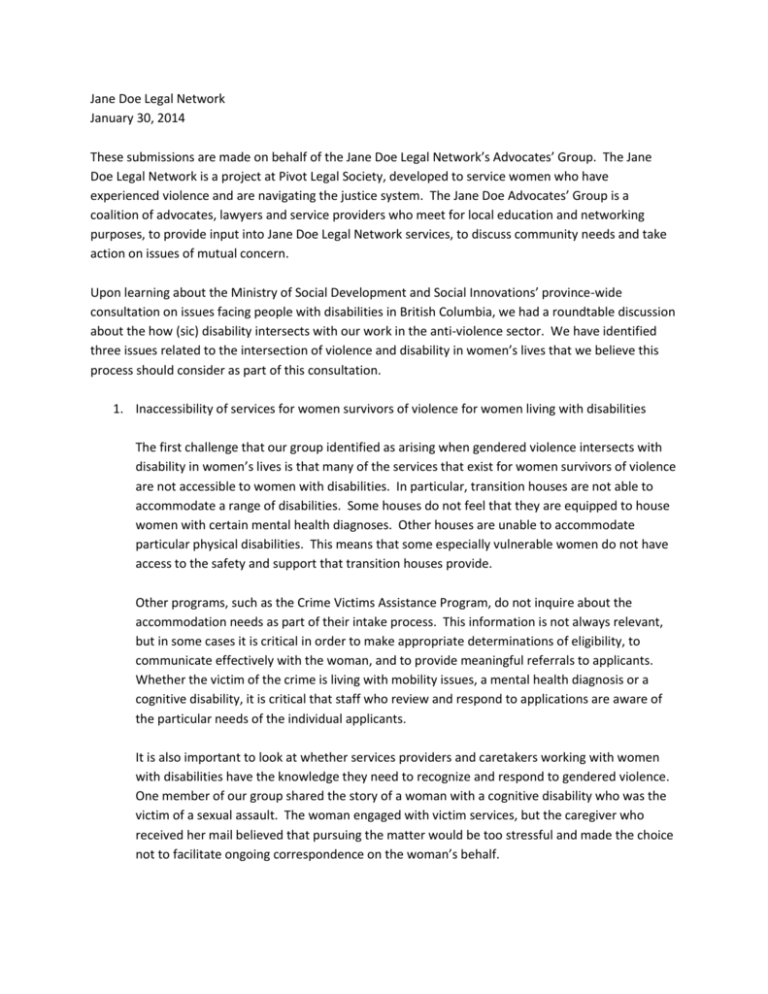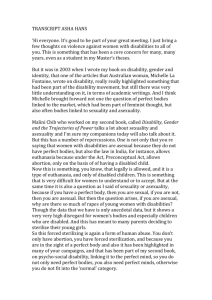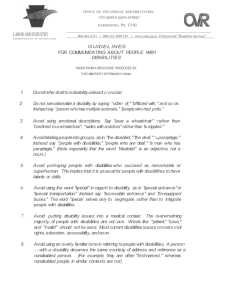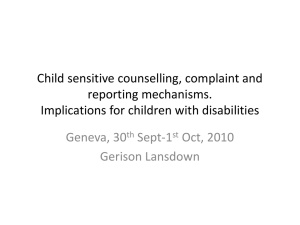Jane Doe Legal Network - Province of British Columbia
advertisement

Jane Doe Legal Network January 30, 2014 These submissions are made on behalf of the Jane Doe Legal Network’s Advocates’ Group. The Jane Doe Legal Network is a project at Pivot Legal Society, developed to service women who have experienced violence and are navigating the justice system. The Jane Doe Advocates’ Group is a coalition of advocates, lawyers and service providers who meet for local education and networking purposes, to provide input into Jane Doe Legal Network services, to discuss community needs and take action on issues of mutual concern. Upon learning about the Ministry of Social Development and Social Innovations’ province-wide consultation on issues facing people with disabilities in British Columbia, we had a roundtable discussion about the how (sic) disability intersects with our work in the anti-violence sector. We have identified three issues related to the intersection of violence and disability in women’s lives that we believe this process should consider as part of this consultation. 1. Inaccessibility of services for women survivors of violence for women living with disabilities The first challenge that our group identified as arising when gendered violence intersects with disability in women’s lives is that many of the services that exist for women survivors of violence are not accessible to women with disabilities. In particular, transition houses are not able to accommodate a range of disabilities. Some houses do not feel that they are equipped to house women with certain mental health diagnoses. Other houses are unable to accommodate particular physical disabilities. This means that some especially vulnerable women do not have access to the safety and support that transition houses provide. Other programs, such as the Crime Victims Assistance Program, do not inquire about the accommodation needs as part of their intake process. This information is not always relevant, but in some cases it is critical in order to make appropriate determinations of eligibility, to communicate effectively with the woman, and to provide meaningful referrals to applicants. Whether the victim of the crime is living with mobility issues, a mental health diagnosis or a cognitive disability, it is critical that staff who review and respond to applications are aware of the particular needs of the individual applicants. It is also important to look at whether services providers and caretakers working with women with disabilities have the knowledge they need to recognize and respond to gendered violence. One member of our group shared the story of a woman with a cognitive disability who was the victim of a sexual assault. The woman engaged with victim services, but the caregiver who received her mail believed that pursuing the matter would be too stressful and made the choice not to facilitate ongoing correspondence on the woman’s behalf. 2. Failure of the family law system to acknowledge the impact of violence in creating disability The scholarly research is clear that disability, whether mental, physical or cognitive, has a profound effect on women’s vulnerability violence and ability to leave a violent or abusive situation. What is less well understood is the role of gendered violence in causing or exacerbating disability. Legal advocates and service providers in our group often raise the concern that by the time women who come to see them, as they are often suffering the effects of years, if not decades, of physical and emotional abuse. The impact of that abuse can include concussions, chronic pain, depression and anxiety. Rather than recognizing the abuse and its detrimental impacts on the woman’s physician and mental health, the disabilities that have developed as a result of the violence are used to undermine the woman’s credibility, call into question her parenting, and ultimately to deny her a family law order that actually reflects the best interests of the children and the woman’s right to safety. It is crucial that this issue be taken into account in adjudicating legal aid applications, in alternative dispute resolution processes and in parent assessments. 3. The child protection system response to mother coping with disability and violence We also know that disability has a negative impact on the perception of women’s ability to parent effectively. Thus, mothers with disabilities are particularly vulnerable to intrusive child welfare interventions, particularly when disability is combined with gendered violence and/or property. We often hear from women with disabilities who reach out for supports that would allow them to care for their children effectively while managing their own health needs because they are concerned about child welfare workers’ response and having their children labelled as “at risk”. For women who are caregivers to children with disabilities, particularly in a context where women are also dealing violence (sic), family court, and/or poverty there is also a concern that reaching out for supports will be perceived as a negative reflection of their ability to parent. In preparing the final paper coming out (sic) this process, it is imperative that the Province apply an intersectional analysis that incorporates gender, experiences of violence, and poverty into the assessment, in order to best meet the needs of all British Columbians living with the impacts of disability. To discuss our submission further please contact: Darcie Bennett, PhD Jane Doe Legal Network Coordinator (604) 255-9700 ext. 102 dbennett@pivotlegal.org 121 Heatley Avenue Vancouver BC V6A 3E9








![an excerpt of the webinar [DOC]](http://s3.studylib.net/store/data/007134267_1-af918ba91d8f5adb16a99f3c2bf4f4df-300x300.png)